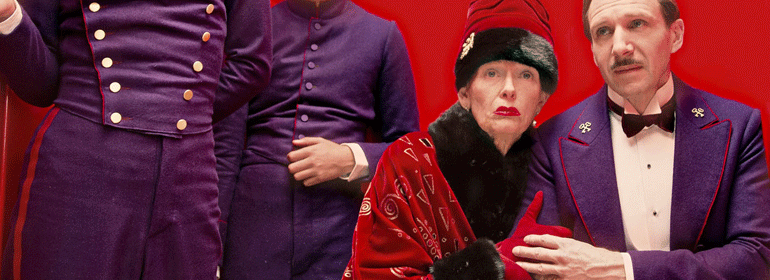Featuring a standout performance from Ralph Fienne’s as a billionairess-bonking bisexual concierge, Wes Anderson’s The Grand Budapest Hotel is typically frothy fare, says Simon Mernagh.
Wes Anderson’s latest venture into the quirky world of whimsy and brusque primary colours is very much a typical ‘Wes Anderson’ film. If you’re not already on board with the divisive American director, then The Grand Budapest Hotel won’t convert you. That said, fully paid-up members of the Anderson Fan Club will demand an extended stay.
Shifting between timelines and points of view, The Grand Budapest Hotel recounts the madcap meanderings of Gustave (Ralph Fiennes), a legendary concierge at the legendary Hungarian hotel between the wars, and Zero Moustafa (Tony Revolori), the lobby boy who becomes his most trusted friend. After the bisexual Gustave sleeps with an octogenarian billionairess (a virtually unrecognisable Tilda Swinton), she leaves him a priceless painting, much to the fury of her children, who come after the concierge with a vengeance. Along the way a cavalcade of character actors pop up, from Adrien Brody and Edward Norton to Saoirse Ronan, Willem Dafoe and Jeff Goldblum.
On its face, The Grand Budapest Hotel is a murder-mystery-adventure, but it’s mainly a valentine to aristocratic, pre-WWII Europe as seen through the eyes of a South Asian immigrant – if Anderson weren’t such an apolitical filmmaker, one might consider this a rather subversive peek at history. His main agendas seem to be nostalgia and a dislike of authority (sprinkled with a love of mentor-figures), and both are on full display here.
This is a movie nerd’s paradise. Budding cinematographers should pack their scribble-books; Anderson’s gorgeous set-pieces are tempered by his trademark explosive colour palette and some truly nifty camerawork. The eponymous hotel is almost Kubrickian in its intricate detail and palpable feeling of space; much like the terrifying setting of The Shining, here the hotel is essentially one big, emotive character.
Speaking of which, the revolving-door cast members are a lively bunch, quirky and peculiar without being full-blown wacky, and they bring gravitas to what would otherwise be a pretty if rather empty adventure. Together Fiennes and Revolori make for a fantastic comic duo, existing in tandem with a disgracefully talented ensemble; of particular note are the menacing Joping (Dafoe), his scheming boss Dmitri (Brody) and an utterly transformed Tilda Swinton.
Actually, The Grand Budapest Hotel is probably Anderson’s darkest output yet – digits get severed and pets are thrown out of windows, but even this is all wrapped in that characteristic Anderson whimsy.
For all its flourish, what’s missing from the film is a Margot Tenenbaum or a Max Fischer, or a Mr. Fox. While Gustave is a charming, incredibly entertaining creation, dandified and played to perfection by the ever-lovable Fiennes, he feels strangely hollow beside Anderson’s earlier protagonists. And for a movie that’s not ‘about’ anything, it lacks the emotional sweep needed for a truly worthwhile experience. It’s like a four-course meal of desserts – yummy for sure, but not so nourishing.
The Grand Budapest Hotel is a rollercoaster ride of pure cinematic exhilaration; thrilling and exciting from beginning to end, you’ll enjoy the experience, but unlike the theme park attraction you won’t be moved in any direction. Undoubtedly a slight regression from 2012’s masterful Moonrise Kingdom, Anderson-devotees will nonetheless rate this particular destination.
© 2014 GCN (Gay Community News). All rights reserved.
